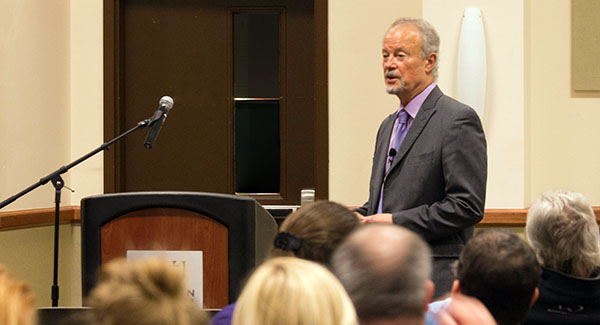Richard Lapchick, Ph.D. delivered his lecture “Diversity in Sports” to a group of Newman University students, faculty, staff and alumni on Tuesday, Nov. 10, covering civic and social issues including race, gender, human trafficking and domestic violence.
Lapchick began his speech saying that after reading in depth what Newman University is and what values it holds, he was excited to come to an institution with the mission to graduate students who will help transform society.
His father – basketball icon Joe Lapchick – played a part in the transformation of society through basketball. The life his father led inspired him to fight for human rights, and Lapchick chose his arena in the world of sport.
Recent news from the University of Missouri strengthens Lapchick’s choice in his field. Protests, hunger strikes and students in fear for their lives could not move the needle in terms of the university recognizing issues of racism on campus. MU football players – with their coach supporting them – would strike unless change came.
Suddenly, students at the University of Missouri were being heard.
According to Lapchick, sports give society a platform on which to talk about civic and social issues because sport brings society together.
He said “everyone in America became a Yankee fan” during the World Series after the city had been struck by terrorism in 2001, because it meant that New York could come back.
Lapchick credits the “miracle of sport” – the huddle – with the power of transformation.
“I can’t think of any other place in this country or around the globe where it no longer matters if you’re African-American or white or Latino or Asian-American or Native American or Arab-American. It doesn’t matter if you’re Protestant, Catholic, Buddhist, Sikh, Jew or Muslim. It doesn’t matter if you’re gay or straight. It doesn’t matter if you come from a rich family or a poor family,” he said. “Your team can’t win unless you pull together.”
“Imagine if we bring that into our classrooms, into our institutions of higher education and the administration, into corporate America, into our churches, what a different world this would be.”
That, he said, is the power of sport.
When asked what Newman University athletes could do to help the community suffering from racism, sexism, human trafficking and violence, Lapchick responded with a recommendation to serve – locally or nationally.
Newman University students, faculty and staff are encouraged to serve their communities through volunteering at local, national and international organizations.
At the beginning of his speech, Lapchick addressed the students sayings he knew they were students in service to the world, and he knew they were going to change the world.
His message was not just about the power of sport, but it was also about the power to transform lives for the betterment of society.
About the Speaker:
Richard Lapchick’s experience combating racism, sexism, human trafficking and violence spans the country and the world – from leading the boycott on sports to cripple the apartheid in South Africa to rebuilding New Orleans with the Orlando Magic after Hurricane Katrina. His references include sports greats such as Kareem Abdul-Jabbar, and the activists he fought alongside, including Nelson Mandela.


